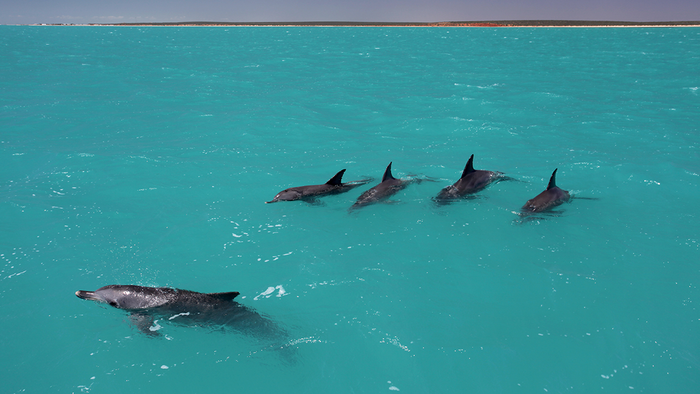Male bottlenose dolphins form bonds that help them find mates - just like humans
Forming lifelong relationships was behaviour only previously seen in humans, reports Aisha Rimi

Male bottlenose dolphins form lifelong bonds that help them find mates - a behaviour previously only seen in humans, researchers have found.
In a study, published in The Proceedings of the National Academy of Sciences (PNAS), a team of scientists from the University of Bristol, University of Zurich and University of Massachusetts found that the marine mammals develop the largest multi-level alliance network outside of humans.
The findings support the “social brain” theory that primates evolved large brains to manage their unusually complex social systems. Both humans and dolphins have the largest brains for their body size compared to all other vertebrates.
The team of scientists analysed the patterns in the social networks of 121 adult male Indo-Pacific bottlenose dolphins at Shark Bay in Western Australia.
They found that male dolphins in Shark Bay formed alliances of two or three males to help each other find female dolphins. The group then grew up to 14 unrelated members, who would compete with other social groups for access to female dolphins.
Dr Stephanie King, co-lead author and associate professor from Bristol’s School of Biological Sciences said: “Cooperation between allies is widespread in human societies and one of the hallmarks of our success. Our capacity to build strategic, cooperative relationships at multiple social levels, such as trade or military alliances both nationally and internationally, was once thought unique to our species.
“Not only have we shown that male bottlenose dolphins form the largest known multilevel alliance network outside humans, but that cooperative relationships between groups, rather than simply alliance size, allows males to spend more time with females, thereby increasing their reproductive success.”
Intergroup cooperation in humans was initially thought to be unique and dependent on the evolution of pair bonds and parental care by males.
“However, our results show that intergroup alliances can emerge without these features, from a social and mating system that is more chimpanzee-like” noted Richard Connor, professor emeritus at the University of Massachusetts and now affiliated with Florida International University, who co-led the study with Dr King.
The team is celebrating the 40th anniversary of the start of the Shark Bay dolphin research in 1982, as well as the 30th anniversary of the publication in 1992 of their discovery of two levels of male alliance formation.
Professor Dr Michael Krützen, an author of the study and Head of the Anthropology Institute at the University of Zurich, added: “Our study shows that important insights about the evolution of characteristics previously thought to be uniquely human can be gained by examining other highly social, large-brained taxa”.




Join our commenting forum
Join thought-provoking conversations, follow other Independent readers and see their replies
66Comments